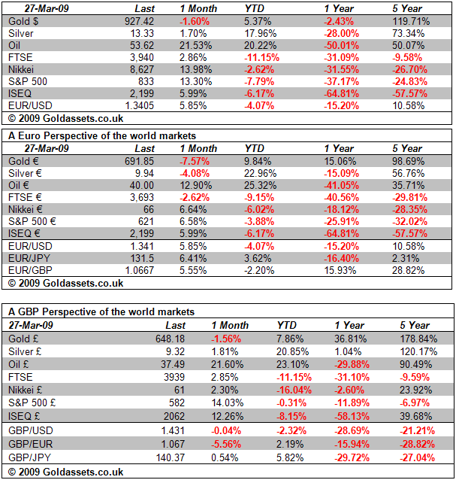March 31st 2009
Is Gold a Hedge Against Inflation and Currency Weakness?
Until the Fed announced an expansion of its quantitative easing program two weeks ago, gold had begun to fade into relative obscurity. Sure, gold had risen in value from a low of $710/ounce back up to $900/ounce, but prices were still off 10% from the highs reached in 2008. Meanwhile, risk aversion had begun to decline and the stock market had begun to rise, such that pundits were talking more about stocks and less about gold.
Since the Fed’s announcement, however, gold has been thrust back into the spotlight. The same trading session that saw a record fall in the Dollar and a record rise in Treasury prices, also witnessed a 7% spike in gold futures prices. ” ‘Money is being pushed into the system and that’s creating the inflationary threats that the markets are contemplating…Commodities are a decent way to hedge against that potential threat,’ ” observed one trader.
Other analysts, however, caution that rising gold prices are a sign of the fear/crisis mentality, not inflation. “There are just not a lot of alternatives for global investors. You will see more and more investors moving into gold as a safe haven, and you will see more institutions putting money into commodities indexes.” In other words, gold is being driven by the safe-haven trade, which is evidenced by an increasing correlation with Treasury bonds. One commentator calls it a hedge against uncertainty: “The demand for gold is for gold coins, a massive flurry of bullion buying by ETF’s (and investors), and the institutions and traders buying the hell out of it. The reason is simple… pure fear.”
With the exception of the perennial gold bulls and conspiracy theorists, the short-term consensus is that due to “massive spare capacity now opening up in the global economy, soaring unemployment and a dysfunctional banking system – it would be very hard for central banks to generate a surge in inflation even if they wanted to.” This analyst further argues that the Fed is undertaking the expansionary program under the implicit assumption that it will have to siphon this money out of the financial system, if and when the economy recovers.
Of course, there is not even a consensus that gold is a good hedge against inflation. Mike Mish points out that the correlation between the US money supply and the price of gold is not very robust. When examined relative to a basket of currencies (rather than the Dollar), however, the relationship suddenly becomes much stronger. Especially when you filter out fluctuations in the value of the Dollar (which is affected by many factors unrelated to inflation), “gold is doing a reasonably good job of maintaining purchasing power parity on a worldwide basis.” This can be seen in the following chart:

Ascertaining a relationship ultimately depends on the time period of analysis, and the currency(s) in which prices are being tracked. Given also gold’s notorious volatility, it probably makes sense to use special inflation protected securities, rather than gold, as an inflation hedge.




March 26th, 2011 at 4:42 am
While it’s true that from 1980 to 1999, gold did not fare well, that’s because central banks adopted the dual policy of gold divestment and petrodollar hegemony. That was obviously only a temporary policy though, since they eventually ran out of gold to sell and the Middle East didn’t like us propping up their tyrants. It started falling apart when Saudi rebels attacked us on 9/11 and when Saddam decided to stop pricing his oil in Dollars in 2003 (which spawned the invasion). Since then, central banks have lost control and now it’s a protracted short squeeze.
TIPS may correlate with inflation, as do stocks to some degree, but gold and silver are the only financial/monetary assets which are not also someone else’s liability. The U.S. government can default on their bonds by either turning up the printing presses and causing hyperinflation (while drastically understating the CPI on which TIPS are based), or by simply not paying them back.
The problem with real estate, farm land, etc., is that it has carrying costs. You have to pay taxes and insurance on it, maintain it, negotiate with any renters, and worry about them defaulting on their obligations.
Gold suffers none of those issues. Gold does not depend on anyone else to pay you — it is itself the valuable asset in your own possession. And other than buying a decent vault, it requires no further maintenance or thought at all. It’s pure insurance. The only risk is that the economy will improve and you won’t need its appreciation and wealth-protection properties. But you still keep the premium anyway! That’s my kind of insurance!
If you want a real nuts-and-bolts, down-to-earth valuation for gold given your own individual inflation expectations, there’s a cool online calculator located here:
http://passantgardant.com/gold-value-calculator
Just enter your estimated probability of various inflation rates, and this calculator will give you a fair value for gold as insurance against inflation using actuarial methods. It includes the ability to specify your own opportunity costs from holding gold instead of an interest-paying alternative. This way you can decide for yourself if gold should be a part of your inflation-hedging portfolio.